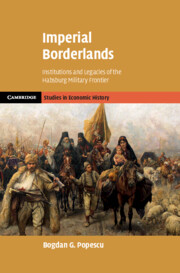Book contents
- Imperial Borderlands
- Cambridge Studies in Economic History - Second Series
- Imperial Borderlands
- Copyright page
- Contents
- Figures
- Tables
- Acknowledgments
- 1 Historical States, Imperialism, and Development
- 2 Imperialism and Extractive Institutions: A Theoretical Framework
- 3 The Habsburg Military Frontier
- 4 Military Colonialism and Economic Development
- 5 Colonial Institutions and Social Norms
- 6 Lasting Legacies Political Attitudes and Social Capital
- 7 Beyond the Habsburgs
- Epilogue
- Book part
- Primary Sources
- Index
Epilogue
Published online by Cambridge University Press: 09 November 2023
- Imperial Borderlands
- Cambridge Studies in Economic History - Second Series
- Imperial Borderlands
- Copyright page
- Contents
- Figures
- Tables
- Acknowledgments
- 1 Historical States, Imperialism, and Development
- 2 Imperialism and Extractive Institutions: A Theoretical Framework
- 3 The Habsburg Military Frontier
- 4 Military Colonialism and Economic Development
- 5 Colonial Institutions and Social Norms
- 6 Lasting Legacies Political Attitudes and Social Capital
- 7 Beyond the Habsburgs
- Epilogue
- Book part
- Primary Sources
- Index
Summary
This final chapter concludes the book with a discussion of the theory’s significance for broader scholarly and policy implications that result from the central argument. Uneven access to public goods throughout a state’s territory can be reflective of historical exposure to institutions that alienated people from central state authority. Importantly, the argument and evidence presented in this book suggest that extractive institutions can affect modern access to public goods through both institutions and attitudes that get transmitted over generations. It also raises the point that while military colonialism is yet another example of the deleterious consequences of extractive institutions for development, it shows that what matters are the specific instruments of colonial extraction, including violence, the removal of private property, as well as underinvestment in public infrastructure and underprovision of public goods.
- Type
- Chapter
- Information
- Imperial BorderlandsInstitutions and Legacies of the Habsburg Military Frontier, pp. 227 - 239Publisher: Cambridge University PressPrint publication year: 2023

